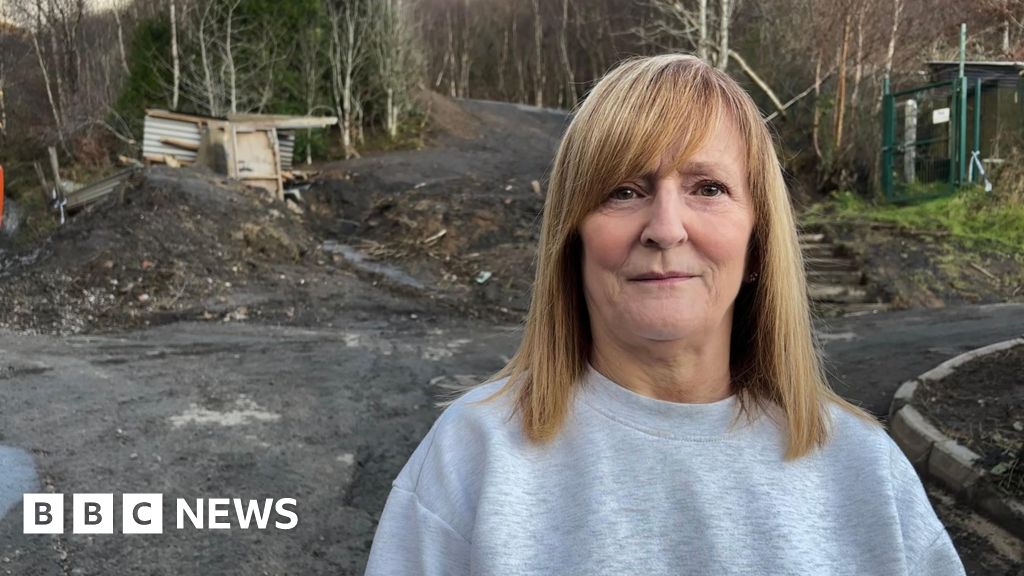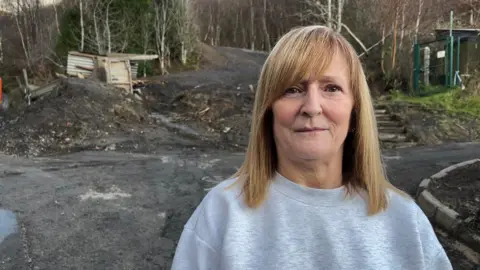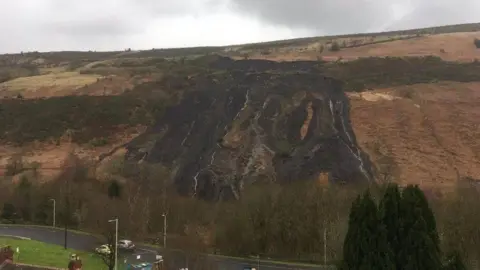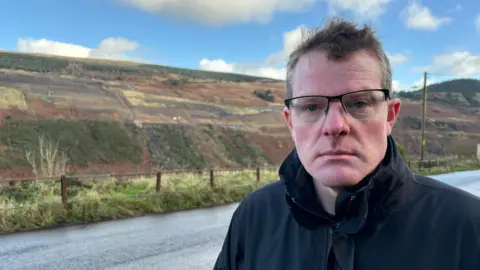
 BBC
BBCResidents who saw a coal tip landslide narrowly miss their homes have said they do not want to live there if the risk of another one remains.
Dianne Morgan, who lives directly below the tip in Cwmtillery, Blaenau Gwent, said she would prefer the council to “compulsory buy [her] home”, while others said they wished to move.
Torrential rain during Storm Bert last month forced some people in the former mining village to evacuate after a river of slurry and debris washed down the road.
The Welsh government will announce a Bill on Monday, which if passed, would mean a new authority takes responsibility for disused tips ensuring they don’t threaten human welfare.
“People here don’t feel safe and I don’t think we’ll be able to sell this home either at the moment. At some point we were going to move from here and downsize but that’s not going to happen now,” Ms Morgan said.
Ms Morgan added she had sought assurances from the council that no further slips would occur once work has been carried out to make the tip safe.
“Our feeling here as residents of the area is that they should just remove the tip,” Ms Morgan said.
Following the incident the council said it had started remedial works to address the immediate issues.
Despite knowledge of the tip’s existence, residents said they were never told it had been categorised as a tip with the potential to impact public safety.
The Welsh Government will propose new legislation that ensures a more effective approach to the management of coal tips.
The Disused Tips Authority for Wales would take responsibility for the assessment, registration, monitoring and management of all tips.
Since a coal tip landslide in Tylorstown, Rhondda Cynon Taf following Storm Ciara and Storm Dennis in 2020, there has been a drive to improve coal tip safety.
The Law Commission found that current law, which was introduced following the Aberfan disaster in 1966, is no longer adequate.

Around 2,500 existing coal tips across Wales – the vast majority in the south – have been categorised based on the risk they pose to public safety and the environment.
The UK government has promised £25million for coal tip safety work to be carried out in Wales. However, it is claimed the sum is nowhere near enough.
Local authorities are responsible for coal tips that are on public land, while other landowners are responsible for the maintenance of tips on private ground.
The Mines Remediation Authority – formerly known as the Coal Authority – is responsible for maintaining a number of tips, including one on the site of the former Caerau colliery in Bridgend County.

Robert Sullivan from the Mining Remediation Authority said: “Many of these sites were remediated in a period when climate change wasn’t really considered and as a result, the Mining Remediation Authority is conducting a review of climate change adaptation of our sites which includes looking at what we can do to better manage these sites during periods of heavy rainfall.
“We’re looking at the installation of remote smart monitoring such as rain gauges and we’re also looking at what we can do in terms of flood alleviation.
“One of the key factors of tip management is the control of ground water and surface water, so we’re trying to alleviate that problem without having created a detrimental impact on people.”
Analysis by Steffan Messenger, Environment Correspondent:
If you follow the news in Wales you’ll have probably seen the video many times.
Shaky footage, hastily filmed on a phone of a hillside above the village of Tylorstown in Rhondda Cynon Taf (RCT) giving way.
“Wow” the man behind the camera gasps – echoing the sentiments of a nation.
The landslide in 2020 reopened a painful scar on the Welsh psyche, and kickstarted a process – both practical and political – to shore up the country’s old coal tips.
It’s hard to believe how little was known then about exactly how many there were, where they were located, who owned the land and what condition they were in.
There’s been a major effort in recent years to plug those knowledge gaps and today’s announcement brings legal reforms and a new organisation to manage the situation in future.
But questions remain over how to foot the bill for a long-term fix, with the leader of RCT council telling BBC News in October as much as £800m could be needed over the coming decades.
Another discussion point is around the involvement of private firms offering to fund remediation work at certain tips by selling the coal they dig out as they go.




